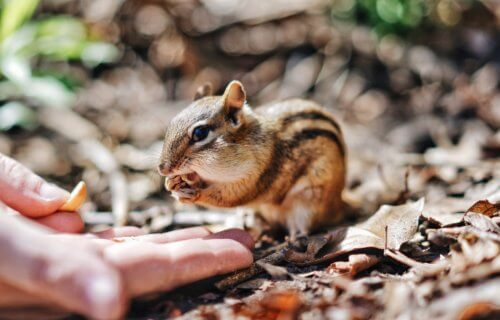MONTPELLIER, France — Survival in the animal kingdom is largely predicated on reacting to, or ideally avoiding altogether, predators. From rats to coyotes, if an animal senses that something higher up on the food chain is nearby, that creature will either play dead, run away, or adopt some other type of “avoidance behavior.” Now, a fascinating new study finds animals largely lose their instinctual fear of predators after interacting with humans.
That interaction can come in a variety of forms: captivity (zoos), domestication (pets), or urbanization (city-living cats, pigeons, etc). Essentially, if an animal spends any amount of time living within close proximity to humans, it appears to abandon most predator avoidance behaviors.
This research, led by Dr. Benjamin Geffroy from MARBEC (the Institute of Marine Biodiversity, Exploitation and Conservation) includes 173 peer-reviewed studies focusing on both behavioral and physiological anti-predator traits or habits. Those studies encompass 102 different species of mammals, fish, birds, mollusks, and reptiles. All studied animals were either domesticated, captive, or urbanized.
Of course, researchers also made it a point to consider each animal’s place on the food chain as well.
How humans disturb the animal kingdom
Overwhelmingly, researchers report that making contact with humans jumpstarts a “rapid loss” of anti-predator traits in animals. Initially, these changes in behavior can vary greatly from one individual animal to another. However, the loss of predatory avoidance behaviors steadily becomes more uniform and widespread among animals in a given location as more generations spend their entire lives around people. The research team speculates this phenomenon is likely due to these animals living in a safer environment, and the fact that humans often breed more docile breeds of animals for domestication purposes.
That being said, even the first generation of animals after contact with humans show significant behavioral changes. Researchers say these early changes may be due to “behavioral flexibility,” which is then strengthened among later generations due to genetic changes in accordance to the environment.
Moreover, domestication appears to change animals’ anti-predatory behaviors three times faster than urbanization. Captivity, though, seems to foster the slowest behavioral changes. Herbivores also tend to adapt their traits faster than carnivores. Similarly, “solitary species” are quicker to change their habits than animals who live within groups.
Scientists say that while it’s not surprising how wildlife adapts to humans, it is stunning to see how quickly behavioral flexibility occurs.
“While it is well known that the fact of being protected by humans decreases anti-predator capacities in animals, we did not know how fast this occurs and to what extent this is comparable between contexts! We also integrated physiological traits in the study but they were much less numerous that behavioral trait,” Geffroy explains in a media release. “We believe they should be systematically investigated to draw a global pattern of what is happening at the individual level. We need more data to understand whether this occurs also with the mere presence of tourists,”
Predictably, these behavioral changes can prove quite troublesome in the event of these animals being re-introduced into the wild. So, these findings may prove invaluable regarding the planning of future conservation efforts, urban layouts, livestock management initiatives, and captive breeding programs.
The study is published in PLOS Biology.
